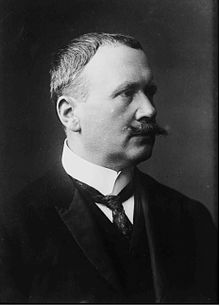Theodor Seitz
Theodor Seitz (born September 12, 1863 in Seckenheim , Baden , † March 28, 1949 in Baden-Baden ) was a German colonial politician.
Life
His parents were the mayor of Seckenheim and businessman Jacob Seitz and his wife Susanna Maria Mieg .
Seitz studied law at the University of Heidelberg , where he became a member of the Vineta black association in 1884 . He received his doctorate as Dr. jur.

After being appointed to the Foreign Service in Berlin in 1894, he was appointed Chancellor of the Governor in the protected area of Cameroon in 1895 and became District Administrator for the Duala District . On May 9, 1907 he became governor of German Cameroon , from August 27, 1910 of German South West Africa (today Namibia ) in Windhoek .
His term of office in Cameroon was marked by the last major military conflicts between the colonial power and the indigenous societies of the southeast ( Makaa , Omvang ). Incidentally, he continued the economic policy of his predecessor Jesko von Puttkamer , which favored planting , and followed the guidelines of the State Secretary in the Foreign Office, Bernhard Dernburg , on a "rational native policy", which protected the indigenous societies from exploitation and displacement by German merchants , but at the same time also sought to exploit the Africans as cheap labor for their own purposes (railway construction, plantation management ). In this context, he repeatedly came into conflict with the merchants, especially in the southern district ( Kribi Chamber of Commerce ).
In South West Africa he could no longer set great accents. With the surrender of the German troops and his capture in July 1915, German colonial rule came to an end. Shortly before, Seitz introduced a cash register note as emergency money , the so-called Seitz notes . Seitz was only able to return to Germany with his staff and soldiers in 1919.
After the First World War, Seitz continued to support the colonial idea and tried to keep it alive with revisionist publications. From 1920 he was President and from 1930 Honorary President of the German Colonial Society .
He married Hildegard Jähns in Berlin in 1907 , a daughter of the officer and writer Max Jähns (1837–1900).
literature
- Klaus J. Bade: Seitz, Theodor , in: Badische Biographien . New episode 2. Stuttgart 1987, p. 258 f.
- Helge Dvorak: Biographical Lexicon of the German Burschenschaft. Volume I: Politicians. Sub-Volume 5: R – S. Winter, Heidelberg 2002, ISBN 3-8253-1256-9 , pp. 413-414.
- Ralph Erbar: Seitz, Georg Friedrich Theodor. In: New German Biography (NDB). Volume 24, Duncker & Humblot, Berlin 2010, ISBN 978-3-428-11205-0 , pp. 207 f. ( Digitized version ).
- Biographical manual of the German Foreign Service 1871–1945. Volume 4: p . Published by the Foreign Office, Historical Service, edited by: Bernd Isphording, Gerhard Keiper, Martin Kröger. Schöningh, Paderborn et al. 2012, ISBN 978-3-506-71843-3 , p. 249f.
Web links
- Short biography at LEO-BW
- Newspaper article about Theodor Seitz in the 20th century press kit of the ZBW - Leibniz Information Center for Economics .
Individual evidence
- ^ Helge Dvorak: Biographical Lexicon of the German Burschenschaft. Volume I: Politicians. Sub-Volume 5: R – S. Winter, Heidelberg 2002, ISBN 3-8253-1256-9 , p. 413.
- ↑ Between the Namib and the Sea - 111 years of Swakopmund bookshop. Allgemeine Zeitung, January 28, 2011.
- ↑ Ralph Erbar: Seitz, Georg Friedrich Theodor. In: New German Biography (NDB). Volume 24, Duncker & Humblot, Berlin 2010, ISBN 978-3-428-11205-0 , pp. 207 f. ( Digitized version ).
| personal data | |
|---|---|
| SURNAME | Seitz, Theodor |
| ALTERNATIVE NAMES | Seitz, Georg Friedrich Theodor (full name) |
| BRIEF DESCRIPTION | German colonial politician |
| DATE OF BIRTH | September 12, 1863 |
| PLACE OF BIRTH | Seckenheim , Baden |
| DATE OF DEATH | March 28, 1949 |
| Place of death | Baden-Baden |
